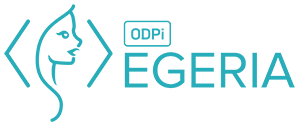Blog Post
Get started with open source project ODPi Egeria
Learn more about the world's first open source metadata and governance standard
Egeria is the world’s first open source metadata and governance standard. It provides open APIs, event formats, types, and integration logic so that organizations can share data management and governance across the entire enterprise without reformatting or restricting the data to a single format, platform, or vendor product. Egeria provides a kind of metadata highway to share metadata information between disparate tools and metadata repositories.
By taking advantage of Egeria’s open metadata, companies can reliably connect their data from different tools and platforms, which means they can access and use their data more effectively.
Egeria is an ODPi project, and the ODPi foundation is part of the Linux Foundation. ODPi is a member-driven organization made up of leaders in data governance who are creating and standardizing solutions that work across platforms, systems, and products. Whether you’re a product vendor who needs a standard for sharing data, a data developer working to share data between products and platforms across an enterprise, or a practitioner integrating various data products to work seamlessly together, ODPi can help. ODPi creates open source standards to help you use and understand data across all platforms.
This blog post provides some helpful resources to get you started using Egeria and explains how to participate in the open source community.
First, let’s look at a high-level overview of how Egeria works to flow content through different areas of an organization.
 Figure 1: Egeria enables the peer-to-peer exchange of metadata between tools from different vendors
Figure 1: Egeria enables the peer-to-peer exchange of metadata between tools from different vendors
Want to get started with ODPi Egeria?

Understand why the Egeria project exists
Why would you use Egeria in your enterprise? Watch this case study video to learn why and how a financial institution uses Egeria.
Try Egeria now
If you want to try out Egeria on your own system, explore how it works, and see it in action, check out this blog to see how to Get started with Egeria notebooks using Docker.
Contribute to the project
Egeria is primarily written in the Java language. Its platform is a spring boot application, and it runs in Docker and Kubernetes. We make extensive use of Jupyter Notebooks and spend a lot of time mapping and integrating different technologies together. If this mix of technology is of interest to you, we are always open to new contributors. In addition, we welcome good technical writers and other media experts to help tell the Egeria story.
Join the conversation
Besides the Egeria documentation page, there are other ways to stay connected with the latest features and articles:
- Join the Egeria Slack channel, mailing list, and learn about upcoming Egeria webinars at the ODPi community page.
- Follow @ODPiOrg on Twitter and LinkedIn for the latest news about Egeria.
- Follow the Egeria blog.
- Join the Egeria community sessions. Check them out at the bottom of the Egeria GitHub page.